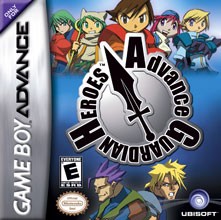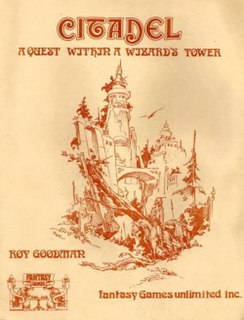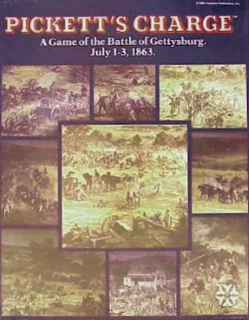
Mythology, subtitled "A Game of Adventure in the Age of Heroes", is a fantasy board game published by Yaquinto Publications in 1980.

Mythology, subtitled "A Game of Adventure in the Age of Heroes", is a fantasy board game published by Yaquinto Publications in 1980.
Mythology is a game in which each player takes the role of a deity from Greek mythology and attempts to control the lives of heroes and monsters. [1]
The game box contains: [2]
Heroes are set up at random locations on the map, while treasures are placed at the edge of the map. Each player secretly draws a Fate counter, which gives them a secret Victory condition.
Each player takes the role of a Greek god who is attempting to control Greek heroes and monsters, either using the heroes to kill monsters or other heroes, or getting the heroes to move to the edge of the board to obtain a treasure. Each player has ten power points per turn which can be secretly allocated to attempting to move up to five heroes or monsters.
Once all power points have been allocated, the first player announces a hero or monster that the player wishes to move, but the player is not required to reveal how many power points are actually being used. (The player could have allocated no power points to he hero or monster, and then can attempt to bluff the other players.) If the active player succeeds in moving a hero or monster without a challenge, the player receives a glory point. [2]
Any player can challenge the active player's attempt to move a hero or monster, either believing that the active player is bluffing and has not allocated any power points, or the active player has allocated less power points than the challenger.
This challenge is resolved by a bidding process, in which the two players use power points up to the number they allocated to the hero or monster in question. (Both players must be truthful about the number of power points they allocated.)The winner of the bidding war steals a glory point from the other player. [2]
Players can use heroes to kill monsters (a reward of three glory points), or other heroes. If the hero killed is controlled by another player who allocated power points to the dead hero, then the victorious player receives glory points. However, if the dead hero was not controlled by any other player, then the victorious player loses glory points. [2]
If a player can get a hero to collect a treasure and bring it home, the player is awarded 50 glory points. This is a rare event — reviewer John Lambshead noted that he had never seen a treasure successfully retrieved. [2]
Mythology was designed by J. Stephen Peek, and was published by Yaquinto Publications in 1980 with cover art by Rodger B. MacGowan. After the demise of Yaquinto, Precis Intermedia acquired the rights to the game, and published a PDF version in 2019. [3]
John Strohm reviewed Mythology in The Space Gamer No. 31. [1] Strohm commented that "This game had promise, but it failed to deliver. I do not recommend it." [1]
Eric Goldberg reviewed Mythology in Ares Magazine #4 and commented that "Steve Peek has proven once again that he is capable of original and appropriate design. He also has shown either an inability or a disinclination to properly develop this game." [4]
Charles Vasey in White Dwarf #22 (December 1980 – January 1981) gave the game a 9 and said "The whole package makes a most exciting game". [5]
In Issue 32 of Phoenix (July–August 1981), John Lambshead was impressed by the production values "as the artwork and physical standards of the components are excellent." However, Lambshead found the game bogged down with more than two players. "As soon as a player tries to do something constructive with a hero it merely becomes a competition to see what kills him first — a natural (unnatural?) disaster or one of half a dozen wandering monsters which immediately jump on him." Lambshead concluded that it was "a game that must be played between small numbers of imaginative people. It is a superb game but a few dumbos can rapidly reduce the whole thing to a bore." [2]

Quest for Glory is a series of hybrid adventure/role-playing video games, which were designed by Corey and Lori Ann Cole. The series was created in the Sierra Creative Interpreter, a toolset developed at Sierra specifically to assist with adventure game development. The series combines humor, puzzle elements, themes and characters borrowed from various legends, puns, and memorable characters, creating a 5-part series in the Sierra stable.
Guild Wars is an online role-playing game franchise developed by ArenaNet and published by NCSOFT. The games were critically well received and won many editor's choice awards, as well as awards such as Best Value, Best Massively Multiplayer Online Role-Playing Game (MMORPG), and Best Game. Guild Wars was noted for being the "first major MMO to adopt a business model not based on monthly subscription fees", its instanced approach to gameplay, and the quality of the graphics and play for computers with low specifications. In April 2009, NCSoft announced that 6 million units of games in the Guild Wars series had been sold. The sequel and fourth major entry into the series, Guild Wars 2, was announced in March 2007 and released on August 28, 2012. It features updated graphics and gameplay mechanics, and continues the original Guild Wars tradition of no subscription fees. The Guild Wars series had sold 11.5 million copies by August 2015

White Bear and Red Moon is a fantasy board wargame set in the world of Glorantha, created by Greg Stafford and published in 1975. Stafford first tried to sell the game to established publishers, but despite being accepted by three different game companies, each attempt ended in failure; eventually he founded his own game company in 1974, the influential Chaosium, to produce and market the game.

Greyhawk Wars is a fantasy board wargame that was published by TSR, Inc. in 1991. The game was designed by David Cook as a strategic simulation of the eponymous Greyhawk Wars on the fictional world of Oerth, the World of Greyhawk campaign setting for the Dungeons & Dragons role-playing game.
Yaquinto Publications was the wargame publishing arm of the Robert Yaquinto Printing Company of Dallas, Texas.

Magic Realm is a fantasy adventure board game designed by Richard Hamblen and published by Avalon Hill in 1979. Magic Realm is more complex than many wargames and is somewhat similar to a role-playing game. It can be played solitaire or with up to 16 players and game time can last 4 hours or more. The game board is a type of geomorphic mapboard constructed of large double-sided hexagon tiles, ensuring a wide variety of playing surfaces.

Space Dungeon is a multidirectional shooter released in arcades by Taito in 1981. Designed and programmed by Rex Battenberg, it was available both as a conversion kit and full arcade cabinet. An Atari 5200 port was released in 1983.

Advance Guardian Heroes is a beat 'em up video game developed by Treasure for the Game Boy Advance. The game was released on September 22, 2004, in Japan, September 14 in North America and February 18, 2005, in Europe. The Japanese version was self-published by Treasure, while the American and European editions of the game are published by Ubisoft.
Fast Attack Boats is a two-player combat board game published by Yaquinto Publications in 1980. The game simulates naval combat between Arab and Israeli missile boats during the 1973 Arab-Israeli War. The game is an introductory level product with an emphasis on playability over historical accuracy.

Stellar Conquest is a science fiction board game designed by Howard M. Thompson that was published in 1974. It is a prototype of the 4X strategy game genre.

Deathmaze is a fantasy board game published by Simulations Publications (SPI) in January 1980 that falls into the general category of dungeon crawls, more specifically, dungeon games in which players enter a dungeon, massacre the dungeon dwellers and steal their treasures.
The Legend of Ares or just "Ares Online" is a free 3D, MMORPG game developed by MGame Inc.. Like many 3D MMORPGs, it is a point and click game, where players can attack monsters (PvE) or other players (PvP), pick up items, and talk to NPCs for items and quests.

Demons is a board game published by Simulations Publications (SPI) in 1979 in which players control magicians who conjure demons to aid them during a treasure hunt.
Swordquest is a 1979 board game published by Task Force Games.

The Beastlord is a fantasy board game published by Yaquinto Publications in 1979.
Hero is a 1980 board game published by Yaquinto Publications.
Time War, subtitled "A Game of Time Travel and Conflict", is a science fiction board wargame published by Yaquinto Publications in 1979.

The Hammer of Thor is a board game for 2–362 players published by Nova Game Designs in 1980.

Citadel: A Quest Within a Wizard's Tower is a fantasy board game published in 1976 by Fantasy Games Unlimited.

Pickett's Charge, subtitled "A Game of the Battle of Gettysburg, July 1–3, 1863", is a board wargame published by Yaquinto Publications in 1980 that is a tactical simulation of the three-day Battle of Gettysburg.